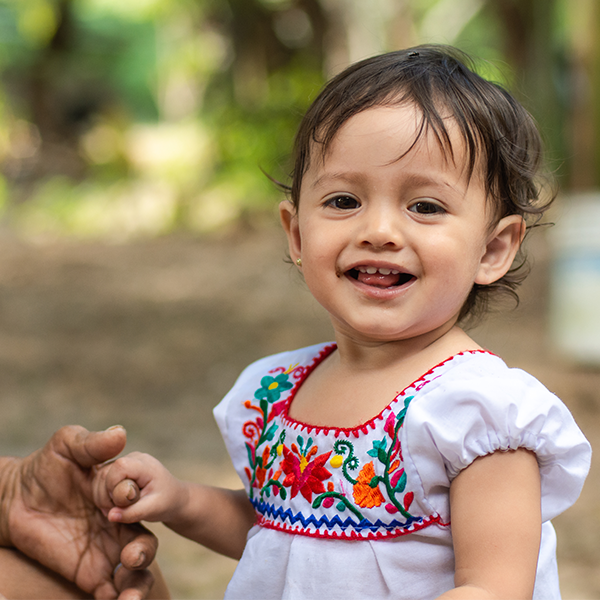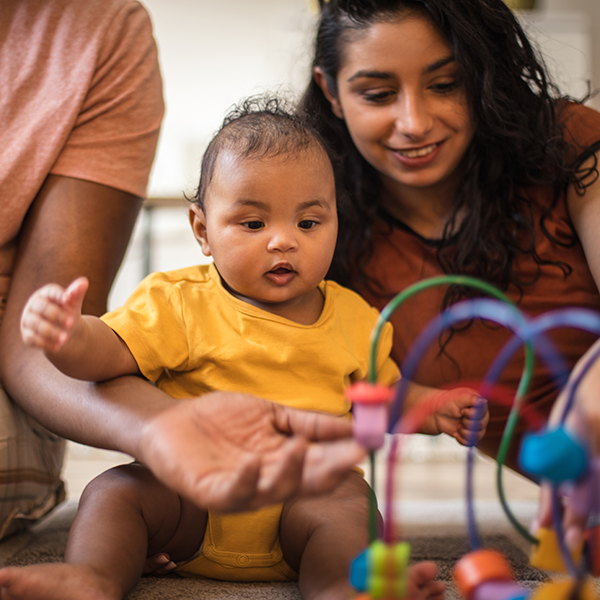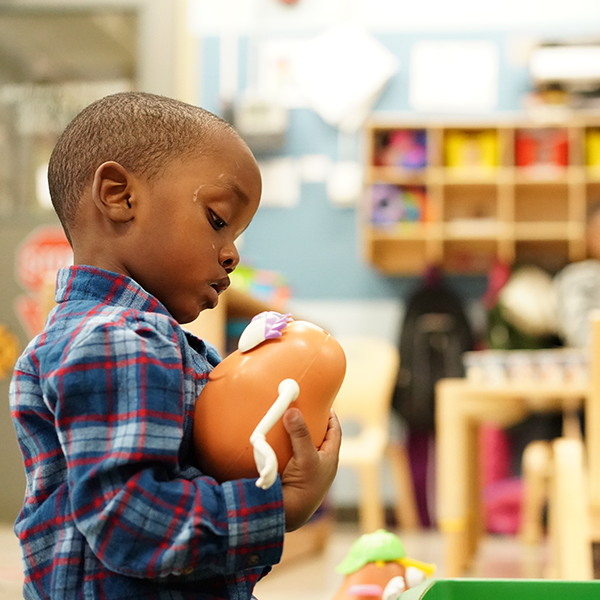Community Conversations
Resources created for your community to come together and discuss solutions to challenges families with infants and toddlers are facing today.
Raising Illinois invites you to bring together diverse individuals within your community, dive into the Roadmap's recommendations and discuss steps that can and should be taken to strengthen care for your community's infants and toddlers and those who care for them.
Community Conversations can take many shapes and forms depending on who you invite and the size of your community. It is the conversation that is critical – not the format, size or location. To help get your planning started, Raising Illinois has created this helpful toolkit.
Once you have plans for your Community Conversation, let us know by emailing Jesse Rojo at jrojo@raisingillinois.org. Don't hesitate to reach out also if you need assistance planning. We can help answer questions and connect you with other community leaders who have already successfully facilitated a Community Conversation.
We also encourage you and your guests to share out key moments and/or takeaways on social media, tagging Raising Illinois and using hashtag(s) #RaisingIllinois and #ILPN3.
Spring 2023 Community Conversations
Raising IL is partnering with organizations throughout the state to host Community Conversations starting in April 2023. Our goal is to explain to community members who our coalition is, share our Prenatal to Three Policy Agenda and have an in-depth conversation to get feedback and learn about the on-the-ground ECE reality in communities. From there, we will utilize the community feedback to continue to improve our agenda and ensure we are aligned with the communities we hope to serve.
On top of this, these conversations will serve as an opportunity to show community members the importance of community advocacy and support them as they try to champion our youngest learners. All conversations are open invitations--consider attending one in your area! If you'd like to host your own Community Conversation please contact Jesse Rojo at jrojo@raisingillinois.org.
Spring 2023 Community Conversations:
- April 4, 5:30pm - SAL Community Services Early Head Start
- April 5, 6pm - Advance Preschool
- April 6, 10am - SIECAT (registration full)
- April 11, 5pm - Gads Hill Center (registration full)
- April 13, 6pm - Peoria CCR&R (to register, contact Brenda Smith at BSmith@salccc.org)
- April 26, 5:30pm - WIU Parent Mentor Program (registration full)
- May 4, 6pm Floreciente Association
Objectives of Community Conversations
- Uplift the needs of infants, toddlers and expecting families through solution-forward conversation that is specific to your community
- Increase and democratize participation in conversations around the local supply & quality of and access to early care and learning resources and the effect on families, providers and local businesses
- Facilitate courageous conversations that increase community connectivity, cohesion and inclusion

Then what?
Coming out of each conversation, each community can develop and offer up a framework that may include:
- Tangible next steps to address gaps in access and critical needs of infants, toddlers and expecting families
- Commitments from local organizations, policymakers, providers and/or advocates to support solutions and continue the conversation
- Plan for identifying compelling spokespeople and leaders to support advancement of solutions
- A "report-back" to Raising Illinois that outlines plans, progress and a commitment to remain engaged with the statewide coalition
Community Conversation Toolkit
The following tools and resources can help you plan your local conversation. Feel free to tailor the materials for your needs! Questions? Email us at RaisingIllinois.org.
Suggested Discussion Guidelines
We want to help you have a rich, vibrant and successful discussion that will leave your community energized to advocate for child care policies, programs and support systems that are accessible, affordable and equitable.
Below you’ll find some guidelines on how to hold these conversations - but we recognize every community is different and conversation paths may diverge. What’s important is providing people with an open space sharing experiences and showcasing ways in which people can continue to stay involved.
Find a place to gather and hold a Community Conversation. Seek out fellow local early care and learning professionals and the general public to join. Then, use the resources throughout this toolkit to guide a conversation. Think of these events as a way to get to know the early childhood needs in your backyard, but also to further build a community that’s dedicated to improving the lives of our youngest generation.
- Welcome and thank everyone for joining the event in-person or online. Provide ample time for introductions and a possible ice breaker.
- Begin with you (and your team, if applicable) and then pass off to other participants.
- Emphasize that the discussion is just one step towards making sure Illinois can better meet the needs of families, and there is much more to be done.
- Make note that everyone came together today to share their experiences, opinions and thoughts around early care and learning resources in your community. There are no right or wrong answers.
- If participants are active on social media, request for them to follow your organization along with Raising Illinois (@RaisingIllinois on Twitter, Facebook and Instagram) to stay up to date on the latest infant-toddler news in Illinois.
- Take a selfie in person and post it online with the hashtags #RaisingIllinois and #ILPN3.
- Encourage participants to share out on social one thing they learned from today’s conversation with the hashtags #RaisingIllinois and #ILPN3.
- Emphasize the importance of speaking about these challenges and solutions beyond just the group that’s meeting today.
- Introduce the Illinois Prenatal to Three Policy Agenda with a quick overview of the Agenda:
- In late 2019, in Illinois, a broad group of 100+ diverse stakeholders convened to develop an ambitious, comprehensive, multi-year and strategic policy agenda that spells out exactly what Illinois families need to have the strongest foundation in their first years of life.
- While our agenda is comprehensive, its structure is clear and simple with four interconnected priorities: healthy parents and babies, high-quality learning, economically secure families and strong infrastructure.
- Participants may share emotional experiences and struggles with accessing early care and learning resources in the community. It’s important to be open and receptive during these conversations.
- When possible and appropriate, refer back to the “so what” acknowledging the Prenatal to Three Policy Agenda and concrete, actionable steps participants can do today to push the needle forward in their community.
- Legislative Action
- Contact your local representative(s) and tell them to support objectives outlined in the Prenatal to Three Agenda.
- Social Action
- Get loud on social! Share out stats, stories and figures that tell the story of early care and learning in Illinois and what we’re trying to achieve as a community.
- Be sure to tag @RaisingIllinois and use hashtags #RaisingIllinois and #ILPN3.
- Community Action
- Start talking! Our voice is the most powerful tool we have.
- Connect with local early childhood providers, see how you can best support them and share information discussed today with those who may be unaware of the challenges in front of families with young children.
- Legislative Action
- Towards the end of the event, go around and ask everyone to commit to one actionable step they’re going to do when they leave this event.
- Have them share it out on social with hashtags #RaisingIllinois and #ILPN3.
- Perhaps, create a pledge they can sign on to.
Invitation Language
Dear [INSERT NAME / ORGANIZATION],
You’re invited to join us on [DATE/TIME] at [LOCATION] for a community conversation on the early care and learning crisis in [LOCAL COMMUNITY] and how we can meet the needs of families in our community.
In partnership with Raising Illinois, a collective effort to close the opportunity gap for our earliest learners, [NAME OF LOCAL GROUP / ORGANIZATION] will host a discussion between families, educators and advocates to explore the Illinois Prenatal to Three Policy Agenda and address barriers to accessing early care and learning resources in Illinois and here in [COMMUNITY].
The need for expanded access to early care and learning resources for infants and toddlers in Illinois is clear—what is less clear is how to overcome the many challenges to meet this urgent need. Sparking conversations within our communities will bring us one step closer to creating an early care and learning system that is accessible, affordable, equitable and inclusive of every infant and toddler in Illinois.
During this community conversation you’ll be joined by:
- [IF RELEVANT, LIST NOTABLE GROUPS AND / OR INDIVIDUALS]
But, most importantly, we want to hear from you! Please use the link below to sign-up for the event and email [INSERT CONTACT EMAIL] with any questions.
Thank you for putting Illinois’ youngest generation first and we look forward to coming together to combat the early care and learning crisis in Illinois.
See you soon!
[NAME]
Messaging & Talking Points
Access to Early Learning & Care
- In Illinois, the child care crisis is acute, as current capacity of licensed child care provides access to only 17.4% of infants and toddlers across the state, with many communities experiencing access rates of less than 10%.
- Access rates fall even further when it comes to high-quality care. Capacity allows for only 5% of infants and toddlers to have access ExceleRate Gold or Silver Circle of Quality rated programs.
- Out of the 25,044 Illinois children eligible for home visiting services, just 15.42% are served.
- Through intentional investment and strategy, Illinois can offer robust services that support expecting parents to help establish healthy foundations and promote opportunities for a child’s developmental and future success and achieve their full potential.
- 75% of Illinois’ infants and toddlers are unable to access to child care.
- 60% of working people in Illinois do not receive unpaid family leave benefits.
- Only 4% of children under age 3 receive Early Intervention (EI) services in Illinois.
Equity Across Early Learning & Care Systems
- Raising Illinois' members are committed to addressing the root causes of disparities and working to create an equitable and cohesive early childhood development system.
- According to the Illinois Department of Health, non-Hispanic Black women are 6x more likely to die of a pregnancy-related condition than non-Hispanic white women.
- Babies born to non-Hispanic Black women in Illinois die at 2-3x the rate of babies born to non-Hispanic white women.
- Many of these deaths are deemed preventable with the expansion and implementation of quality and accessible supports.
- Nearly 50% of children under age 3 in Illinois identify as non-white.
Early Learning & Care Workforce
- Illinois teachers who work with infants and toddlers earn $1.40 per hour less on average than teachers who work with preschool-age children.
- Infant-toddler educators earn significantly less than preschool teachers or teachers in the K-12 system, to the extent that nearly 50% of early child educators rely on public assistance (Sharrock & Parkerson, 2019).
- Infant-toddler teachers tend to have lower education attainment, with 62% of infant-toddler teachers completing a college degree compared with 77% of preschool teachers.
- Most infant-toddler teachers do not hold the Infant Toddler Credential (ITC).
- In fact, as of 2020, only about 13% of infant-toddler teachers hold the ITC.
- Child care professionals do not want to be referred to as “daycare” workers or “providers,” but as "early childhood educators and teachers."
- Language matters and can often set the tone for how early childhood professionals are perceived.
Impact of Income
- Nearly 19% of Illinois' infants and toddlers are living below 100% of the Federal Poverty Level, and approximately only 22% receive Child Care Assistance Program benefits.
- Only 43% of eligible families were served through the Special Supplemental Nutrition Program for Women, Infants & Children, a public support program.
- Poverty is the single greatest threat to a child’s well-being.
- Increasing access to available federal and state benefits—such as expanding eligibility for Child Tax Credit—will ensure more families succeed.
Discussion Prompts
The questions and prompts below are just a starting point for your discussion. We hope that coming together as a community with different experiences and backgrounds will prompt a rich discussion diving deeper into existing disparities across the early learning and care system and identifying solutions for reaching more infants and toddlers. The examples below are centered around child care, but we encourage you to explore any topic that arises during your Community Conversation, such as access to Early Intervention, Income Supports like WIC & TANF, Home Visiting, etc.
For the General Public
- What is the availability of child care for infants and toddlers in your area?
- How has the COVID-19 pandemic impacted child care programs in your area?
- What impact does child care play in our community as a whole?
- How do families with infants and toddlers have impact or influence on your community's businesses/economy?
- What would affordable child care look like for you, and what would this mean for your family/community?
- How can we best support our child care community?
- How do you view child care professionals?
For Parents of Young Children
- What barriers do you face when it comes to accessing child care?
- Do you rely solely on a child care facility or do you have different care arrangements (i.e., family members, babysitters)?
- What resources or support do you need when it comes to child care?
- What sacrifices have you made to access child care (i.e., educational, professional or personal goals)?
- Why are you thankful for the child care professionals in your area?
- What has your child learned because of a child care educator?
- What changes would you like to see made in the child care community?
- What would make it easier for you to continue to be involved in child care advocacy in your community (i.e., resources, meetings, reminders, emails)?
For Child Care Professionals
- What barriers do you face in providing quality services as a child care professional?
- What causes the most stress for you and/or your program day-to-day?
- How does being perceived as a “babysitter” or “daycare worker" impact you and your profession?
- How much need is there for child care for infants and toddlers (under age 3) in your area?
- How many children do you currently have on your waitlist?
- How does the availability or lack of availability of child care impact families and children’s well-being?
- What are some resources or system changes that would make it possible to serve more infants and toddlers?
- Are there any less obvious or small things that could make a difference (i.e., other than money, staffing)?
- How can the community and policy makers address the mental health challenges child care professionals face?
- How can families and the community better support the child care facilities in the area?
- What makes you want to get out of bed in the morning?
For Policy Leaders & Advocates
- At the state level, what policies can be enacted to improve workforce conditions for child care professionals?
- Are there currently policies that would increase access to child care facilities in our community?
- What are the top priorities for the upcoming legislative session?
- What do we need to do to improve the Child Care Assistance Program (CCAP) (e.g., increase access to CCAP, timeliness in processing applications, expand grants)?
- For individuals who want to be involved in or help inform policy decisions, what are some steps they can take in their community to advocate for child care policies?
For Local Business/Community Leaders
- How can you ensure there is dedicated funding to support capacity building within child care?
- As a community leader, what do you need in order to expand infant and toddler child care options in your community?
- Do you currently engage with early childhood professionals directly?
- How can you better ensure available lines of communication between yourself and the child care community?
- How can we reduce the operating costs for child care programs in our community?
- Is there financial and technical assistance available for businesses to help support child care providers?
Community Conversations are meant to not only bring the local community together but also to bring individuals into the conversation who otherwise might not be.
Social media is a great tool to utilize to get our message across and have the conversation continue online. Below you will find some guidelines for using social media to maximize the impact of these conversations, as well as several sample social media posts you can customize and use.
Guidelines
- Make sure your organizations’ social channels are following leaders in the community, parents and policy makers to be able to interact with them on social media prior to the event.
- In the months, weeks and days leading up to you conversation, make sure you’re promoting it on your social media channels with information how others can get involved.
- During the conversation, share out a selfie showing the community coming together and/or tweet out some statistics you’re discussing.
- Perhaps, if someone said something impactful see if it’s alright to post their quote on your channels.
- If you’re quoting someone or trying to get a specific individual’s or organization’s attention, make sure to tag that person in your post.
- Please use #RaisingIllinois and #ILPN3 in all your posts related to the event so we can follow along and uplift your content. Plus, you’ll be able to engage with other communities hosting these conversations.
- After the conversation:
- Share out some pictures, quotes and thoughts via social media encouraging individuals to learn about Raising Illinois and continue to advocate for early childhood issues in their community.
- Share out specific next steps with appropriate information and links for individuals to keep the conversation going.
Sample Social Posts
- #DYK: the 1st 3 years of a child’s life are the most critical for healthy development? Child care professionals play an important role in our children’s’ development. Join us on [DATE] at [TIME] to discuss how we can support child care programs in our own backyard. [LINK TO EVENT] #RaisingIllinois #ILPN3 #ChildCareIsEssential
- Are you interested in advancing positive change for Illinois’ infants and toddlers? Join us on [DATE] at [TIME] for a Community Conversation to discuss how we can set our youngest generation up for success. [LINK TO EVENT] #RaisingIllinois #ILPN3
Reporting Back
We want to hear how these conversations went and any areas of improvement as we continue to urge communities to hold these conversations. Once your event is over, please email us: RaisingIllinois@StartEarly.org. A few things we’ll want to know…
- Location of meeting
- Number of participants
- Topics that rose to the top
- Community actions or next steps committed
- Areas of improvement for next meeting
- Any other thoughts you want to share
This information helps us make a stronger coalition and ensures we’re helping you host events that are impactful to the communities you serve. Thank you in advance for being a part of the Raising Illinois mission.
The Illinois Prenatal to Three Policy Agenda
Bold, Collective Action on Behalf of Infants, Toddlers and Families
If we truly want to end the racial inequities that persist today, we must start at the beginning and ensure that expecting families and babies have what they need for a strong foundation. By launching the Raising Illinois coalition in 2020, we are driving towards the implementation of our state’s agenda and critical changes for Illinois children and families. Join us in this important work.


